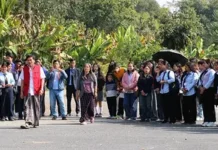[ Yangchen Pema & Romik Sai ]
ITANAGAR, Jul 20: Balemu is a quaint little village near Kalaktang, in West Kameng district. It is 182 kms away from the state capital Itanagar, and approximately 29 kms away from Udalguri in Assam, which is the nearest town to Balemu. The area is the gateway to two districts – Tawang and West Kameng.
This little hamlet is blessed with ethereal scenic beauty, and it can prove to be a perfect escape for backpackers from the chaotic city life. This area shares boundaries with Assam and neighbouring Bhutan, attracting its own clique of tourists.
Agriculture is the main occupation of the villagers of this area. However, despite being a potential tourist hotspot, development is still a far cry in this hamlet. It lacks essential amenities like electricity, potable water system, and educational and healthcare facilities. It was only very recently that the condition of the roads here has improved from being full of potholes to macadam roads.
As this area falls on the trijunction between Arunachal, Assam and Bhutan, the Indian cellular network connectivity is extremely weak here. Furthermore, due to the low population of the area, the Indian cellular companies are not ready to venture into the area. In this context, it isn’t surprising that the people living in Balemu circle use the Bhutanese SIM card, Tashicell, for network connectivity.
Having no other alternative, the villagers are left with no option but to use the SIM card of the adjacent nation, which, however, is illegal under the Indian law.
It is not only the SIM card of Bhutan which has penetrated into Balemu village; even the Bhutanese currency, Ngultrum, is widely accepted in almost every shop, and it is not uncommon to see Ngultrum notes in Balemu area.
Most outsiders would be surprised at the huge Bhutanese influence in the area. But for the people living in Balemu, this is nothing new.
“The Indian cellular service is so weak in the area. What else can we do other than using the Bhutanese SIM card to keep in contact with our families and friends? What would be the point of having a cell phone with no connectivity?” said Phurpa Tashi.
Tenzing Norbu expressed his agony related to the use of Ngultrum currency. “It is usable only in Balemu. Once outside this village, it has no value.”
When faced with the question of the Bhutanese influence in the area, Dorjee Wangdi Kharma, the present MLA of Khalaktang constituency, said it was his primary goal to curtail this problem.
He said he would personally try to identify the underlying causes behind this problem and look into the matter of setting up adequate mobile towers in the area to strengthen the network of Indian SIM cards.
“Major boost would also be given to the education, healthcare and tourism sectors,” he added.
The MLA went to say that developing a model village has to be done through active participation of the local population “as the progress of any region is largely dependent upon the development and unity of the people.”
If adequate attention is paid, by both the government and the locals, this isolated area might begin to turn heads. The picturesque village can become a major location on the map, and could become the actual definition of the paradise that is Arunachal. (Pema is a graduate in journalism from Bengaluru University, and Sai is a first-year student of BA in history at Lady Shri Ram College for Women, Delhi)


